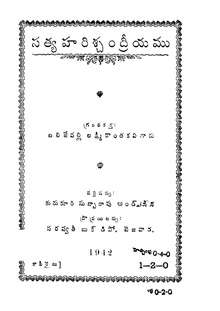Balijepalli Lakshmikantham Kavi
Balijepalli Lakshmikantha Kavi (Telugu: బలిజేపల్లి లక్ష్మీకాంతం) (23 December 1881 – 30 June 1953) was an actor, poet, screenwriter, dramatist and freedom fighter. He is remembered for the masterpiece Harischandra (Satya Harischandriyamu) written in 1924, and for his works in Telugu cinema.[1]
Balijepalli Lakshmikantha Kavi | |
|---|---|
| Born | 23 December 1881 Bapatla taluq, Guntur district |
| Died | 30 June 1953 Sri Kalahasti, Chittoor district |
| Pen name | Balijepalli Lakshmikantha Kavi |
| Nationality | Indian |
| Citizenship | India |
| Education | Matriculation |
| Alma mater | Hindu College, Guntur |
| Genre | Playwright, Poet, Avadhanam, Actor |
| Notable works | Satya Harischandra play |
| Relatives | Balijepalli Seetaramaiah |
Brief life
He was born in Itikampadu village of Guntur district near Bapatla in 1881 to Narasimha Sastry and Adilakshmamma. After matriculation in Kurnool, he worked for some in the Sub-registrar office as Gumasta. He worked as teacher in Hindu College. He used to tour different Zamindaris to perform Avadhanams.[2]
He established Chandrika Printing press in Guntur with the help of Challapalli Raja in 1922. He has participated in Salt Satyagraha and jailed. While in prison, he wrote Satya Harischandriyam drama. He established First drama company in 1926 and played Satya Harischandra and Uttara Raghavam many times. He used to play critical roles in these plays. The most prominent role he used to play was Nakshatraka.
He entered the film industry with encouragement by Chittajallu Pullayya and wrote dialogues and songs and acted in some Telugu films. His debut film as an actor in Vara Vikrayam in 1939. He portrayed the character Lingaraju. He died in Sri Kalahasti in 1953.[3]
Literary works

- Shivanandalahari Satakam (Telugu translation of Shankara's work)
- Swarajya Samasya (Poetic work)
- Brahmaratham (Novel)
- Mani Manjusha (Novel)
- Buddhimati Vilasamu (Play)
- Satya Harishchandriyamu (Play)
- Uttara Raghavamu (Telugu translation of Bhavabhuti's work)
Filmography
- Anasuya (1936) (writer)
- Jarasandha (1938) (lyricist)
- Malli Pelli (1939) (dialogue writer and actor)
- Vara Vikrayam (1939) (dialogue writer and actor)
- Bhukailasa (1940) (dialogue)
- Vishwa Mohini (1940) (dialogue)
- Jeevana Mukthi (1942)
- Bala Nagamma (1942) (writer and actor)
- Tahsildar (1944) (dialogue writer and actor)
- Brahma Ratham (1947) (writer)
- Raksharekha (1949) (dialogues, story writer and actor)
References
- Balijepalli Lakshmikanta Kavi - IMDb
- Luminaries of 20th Century, Potti Sreeramulu Telugu University, Hyderabad, 2005
- Nata Ratnalu, Mikkilineni Radhakrishna Murthy, Second edition, 2002, pages 370-72